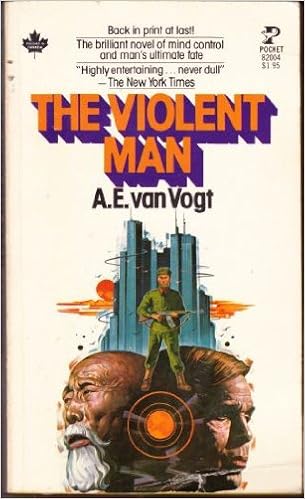Mimsey Borogrove
Crusader
I have always loved A.E. van Vogt's books. When I was in high school I would skip lunch and take the lunch money my mom gave me and buy Si Fi pocket books. That's where the love affair with his writing began. Slan - the story of a man with great intelligence, and telepathic abilities delved into the fear people have of the more able, The Weapon Shops of Ishar - about a company selling guns with chips that were keyed to the emotions of the wielder, and wouldn't fire in anger, The war of the Rull, the world of Null-A, I read all I could get my hands on.
I just finished reading The Violent Man published in 1962 by Pocket Books. I read a post on ESMB that said he modeled the hero on Hubbard. Van Vogt was an early Dianeticest and knew Hubbard well, from the accounts I read. Naturally, I had to get the book, though yellowed with age. It is set in post Korean war Red China, and the subject is brainwashing. Van Vogt has researched the book extensively - it goes into Marx, Lenin, Pavlov, Red Chinese communist propaganda, the prejudices of the Chinese at the time, the history of china's interaction with foreigners, communism in various other countries.
The hero is a sociopath, though that word wasn't used in the book ( it was coined sometime in the 50's ) the protagonist, Seal Ruxton is a philanderer, convinced of his own rightness in all matters. The story opens as he is being transported to distant prison in the center of China for brain washing along with about 30 others from different countries.
One of the key elements of the story is the authors belief that when you truly understand yourself, in this case through self reflection, and through interaction with Major Mai, the warden of his prison and the executer of the brain washing, himself a sociopath, and bent on converting Ruxton to communism no matter the cost, Ruxton is forced to confront his true self.
He does have some secondaries as elements of the story, though not labeled as such. For those that don't know - a secondary is part of Dianetic theory - a moment of loss or threatened loss that has an adverse effect on a person when it gets revived subconsciously. He uses it to really good effect in the story.
The book is well written, and if you plug Hubbard into the place of Ruxton, you get an insight Van Vogt had of the man. However, I think much of Hubbard's bravado was window dressing, here, Ruxton is the real deal. I can't see Hubbard withstanding what Ruxton goes through.
It's a good read - give it a go.
Mimsey
https://www.amazon.com/Violent-Man-Van-Vogt/dp/0671820044

I just finished reading The Violent Man published in 1962 by Pocket Books. I read a post on ESMB that said he modeled the hero on Hubbard. Van Vogt was an early Dianeticest and knew Hubbard well, from the accounts I read. Naturally, I had to get the book, though yellowed with age. It is set in post Korean war Red China, and the subject is brainwashing. Van Vogt has researched the book extensively - it goes into Marx, Lenin, Pavlov, Red Chinese communist propaganda, the prejudices of the Chinese at the time, the history of china's interaction with foreigners, communism in various other countries.
The hero is a sociopath, though that word wasn't used in the book ( it was coined sometime in the 50's ) the protagonist, Seal Ruxton is a philanderer, convinced of his own rightness in all matters. The story opens as he is being transported to distant prison in the center of China for brain washing along with about 30 others from different countries.
One of the key elements of the story is the authors belief that when you truly understand yourself, in this case through self reflection, and through interaction with Major Mai, the warden of his prison and the executer of the brain washing, himself a sociopath, and bent on converting Ruxton to communism no matter the cost, Ruxton is forced to confront his true self.
He does have some secondaries as elements of the story, though not labeled as such. For those that don't know - a secondary is part of Dianetic theory - a moment of loss or threatened loss that has an adverse effect on a person when it gets revived subconsciously. He uses it to really good effect in the story.
The book is well written, and if you plug Hubbard into the place of Ruxton, you get an insight Van Vogt had of the man. However, I think much of Hubbard's bravado was window dressing, here, Ruxton is the real deal. I can't see Hubbard withstanding what Ruxton goes through.
It's a good read - give it a go.
Mimsey
https://www.amazon.com/Violent-Man-Van-Vogt/dp/0671820044

Last edited: